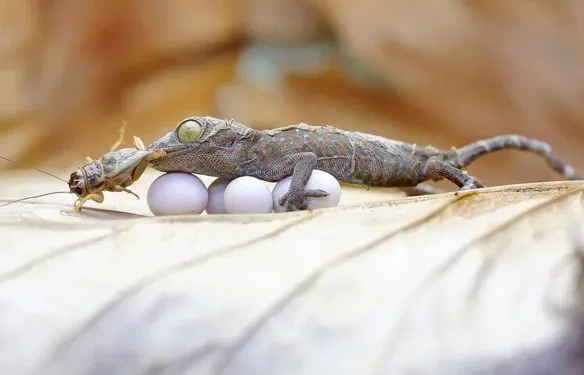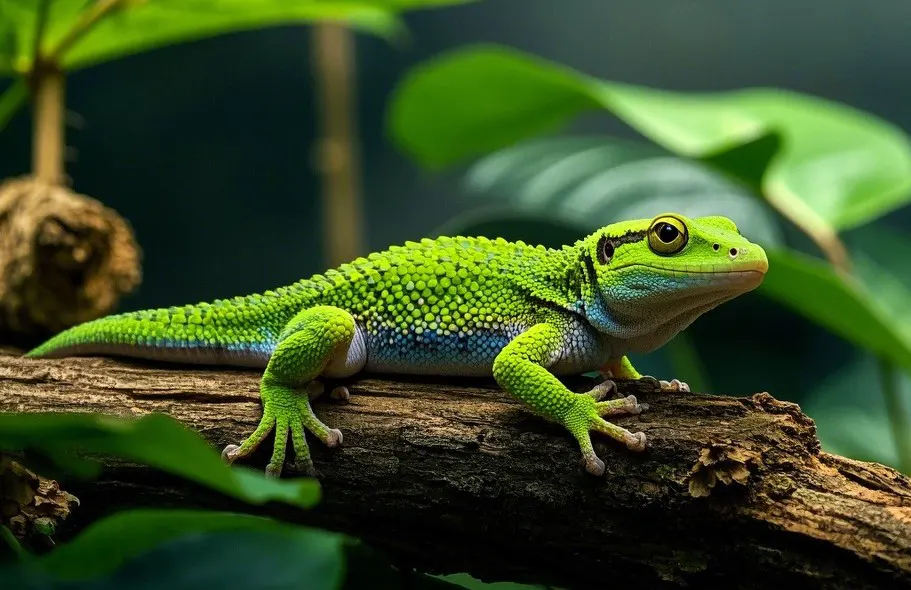Gecko Medical Information & Health Guide
Understanding Gecko Health
Keeping your gecko healthy involves providing excellent husbandry, a balanced diet, and keen observation. Reptiles are masters at hiding illness, so recognizing subtle changes is key to early intervention. This guide provides general information and is NOT a substitute for professional veterinary diagnosis and treatment. Always consult a qualified reptile veterinarian for health concerns.

Common Gecko Health Issues
Being aware of common ailments can help you spot problems early.
- Metabolic Bone Disease (MBD): Caused by improper calcium/phosphorus balance, lack of Vitamin D3 (from diet or UVB), or poor temperatures affecting metabolism.
- Symptoms: Soft/swollen jaw, limb deformities (‘rubber limbs’), lethargy, difficulty lifting body, muscle tremors, anorexia, paralysis.
- Prevention: Proper calcium/D3/multivitamin supplementation, appropriate UVB lighting (if required/beneficial for species), correct temperature gradients.
- Note: Requires immediate veterinary care; severe cases may not be fully reversible.
- Dysecdysis (Shedding Issues): Difficulty shedding skin, often due to low humidity. Stuck shed can constrict toes, tail tips, or eyes.
- Symptoms: Patches of old skin remaining after shed, flaky appearance, constriction rings on extremities.
- Prevention: Provide a proper humid hide, maintain appropriate ambient humidity for the species, ensure adequate hydration.
- Treatment: Increase humidity, provide ‘saunas’ (see Pet Care guide), gently assist with moist Q-tip if needed AFTER soaking. Seek vet help for persistent issues or shed around eyes.
- Respiratory Infections (RI): Often caused by incorrect temperatures (too cool), improper humidity (too high or low depending on species), poor hygiene, or stress.
- Symptoms: Open-mouth breathing, wheezing/clicking sounds, bubbles/discharge from nose or mouth, lethargy, loss of appetite.
- Prevention: Maintain correct temperature gradients and humidity levels, ensure good ventilation, keep enclosure clean.
- Note: Requires prompt veterinary diagnosis and antibiotic treatment.
- Impaction: Blockage of the digestive tract, often from ingesting loose substrate (sand, wood chips), oversized prey, or dehydration.
- Symptoms: Lethargy, loss of appetite, straining to defecate or lack of feces, bloating/swollen abdomen, sometimes visible lump.
- Prevention: Use safe substrates (paper towel, tile, reptile carpet), feed appropriately sized insects, ensure proper hydration and temperatures for digestion.
- Note: Mild cases may resolve with warm soaks and hydration. Severe cases require veterinary intervention (laxatives, enemas, possibly surgery).
- Parasites (Internal & External): Internal (worms, protozoa) or external (mites, ticks). Often present in wild-caught or newly acquired animals. Can spread in unclean conditions.
- Symptoms (Internal): Weight loss despite eating, lethargy, abnormal/runny/foul-smelling feces, anorexia.
- Symptoms (External): Visible mites (tiny moving dots, often reddish or black) around eyes, vents, skin folds; excessive soaking; skin irritation.
- Prevention: Quarantine new animals, maintain strict hygiene, buy from reputable sources.
- Note: Requires veterinary diagnosis (fecal exam for internal, visual for external) and specific treatments (dewormers, mite treatments).
- Stomatitis (Mouth Rot): Infection/inflammation in the mouth, often secondary to injury, poor nutrition, or incorrect temperatures.
- Symptoms: Redness/swelling around mouth, cheesy/pus-like discharge in mouth, loss of appetite, reluctance to eat.
- Prevention: Proper diet, correct husbandry, minimizing stress/injury.
- Note: Requires veterinary cleaning and antibiotics.
- Eye Issues: Infections, stuck shed over the eye, Vitamin A deficiency (hypovitaminosis A), trauma.
- Symptoms: Swollen/closed eyes, discharge, cloudiness (if not shedding), retained eye caps after shed.
- Prevention: Proper humidity for shedding, correct Vitamin A supplementation (use preformed Vitamin A, not just beta-carotene), clean environment.
- Note: Requires veterinary diagnosis to determine the cause and appropriate treatment (antibiotics, supplements, manual shed removal).
Preventative Care is Key
The best way to handle health issues is to prevent them in the first place.

- Correct Husbandry: Providing the right temperature gradient, humidity levels, substrate, hides, and enclosure size is the foundation of good health. Research your specific species’ needs!
- Balanced Diet & Supplementation: Offer a varied diet of gut-loaded insects (or appropriate CGD) and supplement correctly with calcium/D3 and multivitamins.
- Cleanliness: Regular spot cleaning and periodic deep cleaning prevent harmful bacteria, mold, and parasite buildup.
- Quarantine: Keep new geckos separate from existing collections for at least 30-90 days in a different room with separate supplies to monitor for illness and prevent disease spread.
- Minimize Stress: Avoid excessive handling (especially with new or shy animals), loud noises, and improper environmental conditions.
- Observation: Regularly observe your gecko’s appearance, behavior, appetite, and droppings. Note any changes.
General Signs of Illness
Be alert for these general warning signs that may indicate your gecko needs veterinary attention:
- Significant decrease or complete loss of appetite
- Noticeable weight loss or thinness (visible spine/hip bones)
- Lethargy, weakness, inactivity, hiding excessively
- Difficulty moving, tremors, seizures, paralysis
- Swelling (limbs, jaw, abdomen, eyes, vent)
- Abnormal feces (runny, discolored, foul-smelling, bloody, contains undigested food) or lack of feces
- Discharge from eyes, nose, or mouth
- Open-mouth breathing, wheezing, clicking sounds
- Skin issues (lesions, abnormal bumps, persistent stuck shed)
- Changes in coloration (aside from normal shedding)
Finding a Reptile Veterinarian
Not all veterinarians are experienced with reptiles. It’s crucial to find a qualified exotic or reptile vet *before* an emergency arises.
- Seek Specialists: Look for vets who specifically list reptiles or “exotic animals” as a specialty.
- Ask for Recommendations: Local reptile societies, reputable pet stores (that specialize in reptiles), or experienced keepers can often provide recommendations.
- Online Resources: Websites like the Association of Reptilian and Amphibian Veterinarians (ARAV) have find-a-vet tools (availability varies by region).
- Prepare Questions: When you call a potential clinic, ask about their experience with geckos or your specific species.
- Establish Care: Consider a wellness check-up for your gecko shortly after acquiring it or annually to establish a relationship with the vet.